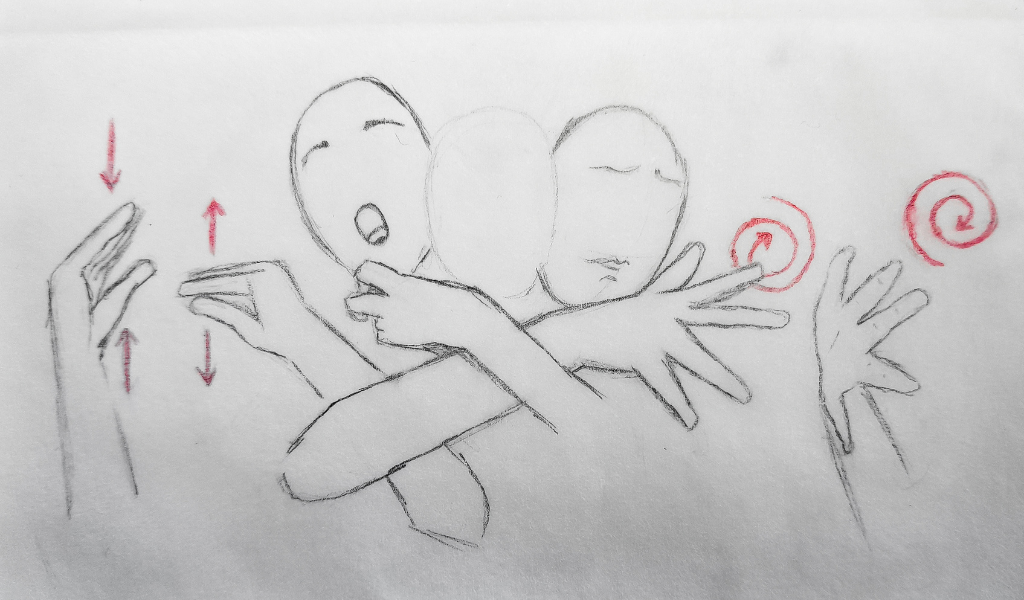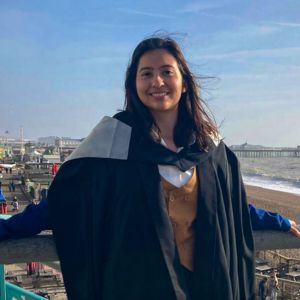Ana Palma Garcia, graduate of the IDS MA Power, Participation & Social Change, won the DSA’s Masters Dissertation Prize 2024 for her work entitled: “Co-constructing notions of inclusion with Deaf women in Colombia throughout cooperative inquiry”.
To celebrate Global Accessibility Awareness Day, we caught up with Ana to find out more about her own experiences of accessibility and inclusion.
Interviewer: What does ‘accessibility’ mean to you?
Ana: I understand ‘accessibility’ as the tools we need to enjoy a place and an activity. It’s like needing a torch or night vision goggles to navigate in the dark. Bats might find it easy to do, and blind people might be able to do it effortlessly too. But the rest of us will need a tool to rely on, and accessibility means having the necessary aids and support to feel capable of enjoying an activity or space. It’s not that we can’t walk in the darkness, we can, but in what conditions? Scared, anxious, injured, lost? It’s about having what we need to do it safely and comfortably.
To me, accessibility is the part of inclusion that addresses tangible barriers such as formats of communication, infrastructure design, flexible deadlines, sensory-friendly environments, text-to-speech software, and many others. It aims to tackle specific barriers that can be fixed with the tools or adjustments to help people reach a place or not miss out on an experience. Most importantly, I think accessibility is necessary for inclusion, but alone can’t guarantee true inclusion.
Interviewer: Can you describe your experiences studying at IDS through the lens of someone who has invisible disabilities? Is there anything IDS could have done differently or better?
Ana: Coming from a country (Colombia) where policies of inclusion and accessibility exist almost exclusively on paper, I initially struggled to even articulate what accommodations to ask for. It’s challenging to advocate for yourself when you haven’t had the opportunity to even imagine that you can ask for things to make your life easier.
In that sense, I am grateful for the understanding and support I received from the disability advisor at the University of Sussex and the Teaching Team at IDS. They guided me, very patiently, through a ‘menu’ of available adjustments and worked with me to make ongoing adjustments, by removing or incorporating things as I saw fit. I learned a lot about what I need and what I should ask for from this experience. I remember that, at first, I didn’t want any adjustments because I didn’t think I needed them. I had done ok without them, and it seemed like an extra thing to worry about.
Honestly, I felt I wasn’t disabled enough to ask for things and get an unfair advantage over my peers. Thankfully, they convinced me to try some just to see how I felt, and I soon realised I’ve need that support all my life. I came to realise that just because I can do something without support doesn’t mean I should endure it to the point of burnout.
Of course, there is always room for improvement. One area I discussed with the disability advisor was the importance of ensuring that note-takers, often fellow students with their own academic workload, understand that the services they provide are not just favours they do to us in their free time but essential accommodations for our academic performance. It’s important that those who rely on these services never feel that they are expected to prioritise the needs of others (like note-takers failing in their duties in order to meet their own deadlines) over our own when it comes to accessing our own accessibility services.
Interviewer: What advice would you give to someone with a disability who maybe considering studying at IDS?
Speaking specifically from the perspective of someone with invisible disabilities, I would say that IDS is a great place to both learn and explore the possibilities available, as well as to feel heard. Unlike some other institutions, IDS and the University of Sussex respected my autonomy and allowed me to make decisions about accommodations that suited my needs rather than imposing what they see fit. I didn’t feel alone in this process, and more importantly, I wasn’t ignored or dismissed when I had complaints.
Interviewer: How have the women who you worked with on the study responded to this research being so well recognised and regarded?

Ana: We have had mixed feelings. There is a sense of joy and pride: it’s not every day a member of the Deaf community gets to be heard while echoing experiences of Deafhood. Historically, these communities have been wary of researchers who have perpetuated stereotypes, misrepresented the community or taken information without giving back. They feel proud that someone who is part of the community has not only managed to go to university (both in Colombia and then abroad) but has also won an award while telling our story. It’s something very unusual and something to be proud of.
However, there’s also a feeling of frustration or disappointment because such important recognition feels invisible beyond our circle. It is international recognition that brings us much joy, but still seems irrelevant in Colombia. They understand change doesn’t happen overnight – nor with an award – but there’s a sense of celebrating in a vacuum because it hasn’t (yet) led to broader conversations.
Nevertheless, we’ve continued to work together, creating those spaces in our own contexts. For instance, we had a particularly impactful experience when we encouraged several members of the Deaf community to join the feminist march of 8M (internation women’s day) for the first time. We met to paint posters with phrases that resonated with our dialogues, and facilitated a workshop discussing what feminism was and its relevance to our lives. It was heartening to witness their joy experiencing for the first time being surrounded by hundreds of women and feeling part of something bigger than just being Deaf.
Interviewer: Are there are barriers faced by the Deaf community which are unique to living in Colombia / being a woman? What changes would you like to see happen?
Ana: I don’t think is necessarily unique to Colombia, but there are unique situations of vulnerability that Deaf women face in comparison to Deaf men. For instance, issues related to the prevention and response to domestic violence or cases of sexual abuse often overlook the needs of Deaf women. The reporting channels available often lack the necessary accessibility features to accommodate them, relying primarily on phone calls or on having someone else to report rather than being able to seek help independently.
I find disconcerting, too, that Deaf women are isolated from feminist movements. For example, they lack access to sex education and reproductive health information. I’ve met Deaf women who have entered into marriages or sexual relationships without the full understanding or consent of what they are doing. This lack of knowledge can leave them vulnerable to exploitation, abuse, and unintended pregnancies. There have also been cases of doctors abusing Deaf women and them not being able to communicate what was happening to anyone because both their families and healthcare providers, not knowing sign language, misinterpret their behaviour as psychiatric symptoms rather than recognising signs of trauma.
There are so many changes I would like to see happen; I can’t possibly name them all. But what I want is for inclusion to become a fundamental aspect of all facets of society, not just limited to discussions about disability. It should be, in reality and not just discourse, a cross-cutting approach. Any debate and policy related to education, healthcare, women’s rights, LGBTQ+ rights, immigrant’s support, suicide prevention, mental health promotion, economic reactivation, sports and recreation, and every single aspect of human experience should be approached inclusively and intersectionally. It is useless to bring up inclusion only when discussing disability, because (a) it’s essentially ghettoising the issue, and (b) how can we expect people with disabilities to be involved if such spaces and policies they are not initially designed to accommodate their presence or even benefit them?
